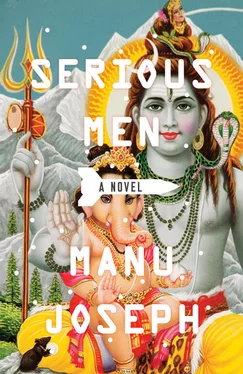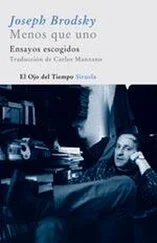‘Four,’ Acharya said, without taking his eyes off from the ants.
‘Up — down, left — right, front — back,’ Ayyan said. ‘Then?’
‘Think of time ticking away as these ants try to go somewhere in a universe that has length, breadth and height. That’s another dimension,’ he said.
Ayyan tried to imagine it, and reluctantly ceded the point. ‘OK, four. But why do they say there are ten dimensions?’
‘I don’t know, Ayyan. I used to know but I don’t any more.’
‘Some men have been working on that for twenty years, Sir.’
‘You’re right.’
‘And that’s their job? To prove that there are ten dimensions?’
‘Yes, that’s their job.’
A peon arrived with coffee and said to Ayyan, ‘You are here? Director is looking for you.’ He stuck his tongue out like a terrified little boy and glanced apologetically at Acharya for using ‘Director’ in reference to another man.
Acharya simply asked, ‘No biscuits today?’
Ayyan knew there was trouble when he saw the face of Nambodri, who was sitting with the grim inner circle on the white sofas.
‘Who writes the Thought For The Day?’ Nambodri asked.
‘What thought, Sir?’ Ayyan said.
‘The daily quote on the blackboard. Who writes it?’
‘Oh, that. I write it sometimes, Sir.’
‘Not every day?’
‘Most of the days, Sir.’
‘Did it you write it today?’
‘Yes, Sir.’
‘Today’s quote was, “A greater crime than the Holocaust was untouchability. Nazis have paid the price, but the Brahmins are still reaping the rewards for torturing others.” Is that correct, Ayyan?’
‘Yes, Sir.’
‘The blackboard says Albert Einstein said this.’
‘Yes, Sir, that’s what was written on the chit.’
‘What chit?’
‘I get the Thought For The Day every morning from Administration, Sir.’
‘Who in Admin sends it to you?’
‘I don’t know, Sir. A peon leaves it on my table.’
‘What is the name of the peon who leaves it on your table?’
‘I don’t know his name, Sir.’
Nambodri folded his hands and crossed his legs. ‘A week ago,’ he said with a smile, ‘the Thought For The Day read, “If souls are indeed reborn as the Brahmins say, then what accounts for population growth? Rebirth is the most foolish mathematical concept ever.” Apparently Isaac Newton said that.’
‘That’s what the chit said, Sir.’
‘Ayyan, how long have you been writing the Thought For The Day?’
‘A few years, Sir.’
‘And who asked you to write it?’
‘Administration, Sir.’
‘Who exactly?’
‘I don’t remember, Sir.’
‘Stop this bullshit,’ Professor Jal said rising angrily. Others asked him to calm down. Jal sat down breathing hard, glasses trembling on his nose-bridge.
‘You know Professor Jal, of course,’ Nambodri said kindly to Ayyan. ‘And you know what BBC Mastermind is?’
‘Yes, Sir, I used to watch Mastermind. My wife would fight with me. Because, you know, she wanted to watch …’
‘Jal once won Mastermind. His area of specialization was Einstein. He knows every word that man ever wrote, every word that man ever said. Einstein never said anything about Brahmins. And Newton, my friend, probably did not know what a Brahmin was.’
‘That’s shocking, Sir.’
‘Is it, Ayyan?’
‘Yes, Sir. Someone has been giving me fake quotes.’
‘You don’t like Brahmins very much?’
‘Sir, I’m going to find out who has been giving me the fake quotes.’
‘Shut up,’ Nambodri screamed, which shocked the others. They had never seen him angry. Ayyan loved the sight. He gave a benevolent smile to Nambodri.
‘Stop, stop, stop fooling around,’ Nambodri said. ‘Stop this, this rubbish. You’re talking to men with IQs that you cannot even imagine.’
‘My IQ is 148, Sir. What is yours?’
A silence filled the room. Nambodri looked intently at the floor. A foolish pigeon banged into the window glass and banged one more time before changing direction. A phone rang somewhere far away.
‘I got into Mensa when I was eighteen,’ Ayyan said.
‘Was there a 15 per cent reservation for Dalits?’ Nambodri asked. The astronomers burst out laughing. Nambodri walked a few steps and stood a foot away from Ayyan. ‘I don’t want you ever to touch that blackboard again, do you understand?’ he said.
‘Yes, Sir.’
‘And I hear you have been asking the peons to get coffee for your master.’
‘And fruit and meals too, Sir.’
‘I see, I see. You’re good at that kind of thing, aren’t you? We all should stick to our strengths, Ayyan. What do you say? We will figure out the universe. And you will bring coffee. Let’s stick to that for the good of everyone. What are you waiting for? Go and get us some coffee, Ayyan. Right now.’
Ayyan went to his desk and took out the silver dictaphone from the top drawer of the table. He turned on the speaker mode of one of the landlines.
‘IQ of 148,’ the voice of Nambodri was saying. ‘If Dalits can have that sort of an IQ, would they be begging for reservations?’
‘Did you see the way he was talking?’ Jal said. ‘I can’t believe this. That’s what happens when you put someone who is meant to clean toilets in a white-collar job.’
‘He was in Mensa,’ Nambodri said, and there was a crackle of laughter. ‘Just because his son is some kind of a freak, he thinks even he is.’
‘Something fishy about his son,’ someone said. ‘I have never come across a Dalit genius. It’s odd, you know.’
The astronomers continued in this vein. They spoke of the racial character of intelligence and the unmistakable cerebral limitations of the Dalits, Africans, Eastern Europeans and women.
‘If there are clear morphological characteristics that are defined by the genes, obviously even intellectual traits are decided that way,’ Nambodri said. ‘Look at women. They will get nowhere in science. Everybody knows that. Their brains are too small. But our world has become so fucking politically correct, you can’t say these things any more.’
They spoke about the debilitating influence of reservation in education and the dangerous political resurgence of the Dalits. There was a pause in the conversation and Ayyan was about to turn off the speaker mode. He thought the men were about to walk out. Then Nambodri made a comment about Ambedkar which stunned even Ayyan. What Nambodri had said about the liberator of Dalits was so damning that the silver dictaphone in Ayyan’s hand was a weapon that could consign to flames not just the Institute but also the whole country.
Ayyan went down the corridor trying to calm the tumult within. Midway down the corridor, he veered left towards the small pantry. A peon was washing the cutlery in the sink. Two others were making coffee. Ayyan played the recorder and put it on the kitchen platform. The peons did not understand the voices at first, but soon their faces began to change. They stopped what they were doing and listened. As the voices spoke, Ayyan translated some difficult portions into Marathi.
‘Genes are things that parents pass on to their children,’ Ayyan told them. ‘You are black because your parents were black. They are saying that you are dumb because your parents were dumb. And the Brahmins are smart because their parents were smart. And they are saying about me that I am only fit to be a toilet-cleaner because I am a Dalit.’
When the recording ended, he put the dictaphone in his pocket and said, ‘They want coffee. They said they want coffee right now.’
One of the peons filled a jug. He stared at the other peon and at Ayyan in the fellowship of the moment. He opened the lid of the jug and spat into it.
Читать дальше












